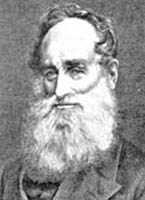Classic DACB Collection
All articles created or submitted in the first twenty years of the project, from 1995 to 2015.Moffat, Robert (B)

Robert Moffat, a pioneering Scottish Protestant missionary and Bible translator, was the father and founder of missionary work in South Africa.
Moffat came from a simple Scottish family and was apprenticed as a gardener. After a conversion experience, he applied for missionary work and was accepted by the London Missionary Society (LMS) in 1816. His first years in South Africa were spent in Namaqualand, where he converted a chief who was sought by the local colonial authorities. Moffat earned government support when officials realized that he had solved a problem through his religious efforts. Moffat also explored the Kalahari Desert and, as a result, was named to head a mission station. On his way he encountered a flood of refugees fleeing the advance of the Ndebele under Mzilikazi. These people soon took over a number of villages, and Moffat rushed to warn the neighboring communities. In a fierce struggle, the refugees were driven off. Moffat’s reputation among the people he saved was immensely enhanced.
In 1824 he went on to Kuruman, the northernmost outpost in South Africa. Here, despite raids by bandits and other difficulties, he stayed for half a century. Moffat was an indefatigable linguist. Within a year he had completed a grammar of SeTswana and had begun translating the Gospel of Luke. In 1829 his work finally bore fruit, and the services were crowded. Within a few years there were well-instructed converts, a flourishing school, and a permanent church.
Moffat made contacts with Mzilikazi and accepted an invitation to visit him in his kraal; as a result, a warm relationship developed between the two. In 1837 the Afrikaners began to penetrate the area and came in conflict with the Ndebele, causing the destruction of a U.S. mission and the loss of many cattle. The Ndebele emigrated, and for a time Moffat lost contact with them. He used the time to take a sabbatical in England (1839-1843), where he completed his translation of the New Testament and psalms and wrote a series of scripture lessons. He also met David Livingstone and recruited him for the mission. Livingstone was one of a group of young men who extended Moffat’s work into the hinterland. On a recuperation visit to Kuruman, Livingstone met and married Moffat’s daughter, Mary, in 1844.
This period was one of organizing and systematic evangelizing in southern Africa. Mission stations spread across the north of the country, and Moffat maintained supplies and communication. At the same time he completed his Se Tswana Bible (1857), a translation of The Pilgrim’s Progress, and a hymnbook. He traveled extensively, even though he was by this time more than 60 years old. In 1854 he set out across the Kalahari Desert, covering over 700 miles (approximately 1, 120 kilometers), a good deal of it by compass over uncharted country. He finally found his old friend Mzilikazi, and after reestablishing their friendship, he made arrangements for a permanent mission among the Ndebele. He returned in 1857 and again in 1859, personally manning the forge and taking part in constructing the necessary buildings. Moffat assumed a mythical and prophetic character among the Ndebele. A persistent - but false - legend had it that Moffat had foretold the coming of the Afrikaners before the Great Trek began and told the Ndebele how to travel north.
By 1870 two of his children were dead, another was widowed, and his wife’s health was precarious. The Moffats then returned to England where his wife died. Covered with honors, Moffat spent the last years lecturing and promoting missionary work. He wrote several volumes of memoirs, which are valuable sources for the history of the region.
Norbert C. Brockman
Bibliography
Lipschutz, Mark R., and R. Kent Rasmussen. Dictionary of African Historical Biography. 2nd edition. Berkeley: University of California Press, 1986.
Dictionary of National Biography. London: Oxford University Press, 27 volumes, 1921-1959.
The New Encyclopedia Britannica. 15th edition. Chicago, IL, 1988.
Additional reading: Murray-Brown, Jeremy. Faith and the Flag (1977); Northcott, W. C. Robert Moffat: Pioneer in Africa (1961).
This article is reproduced, with permission, from An African Biographical Dictionary, copyright © 1994, edited by Norbert C. Brockman, Santa Barbara, California. All rights reserved.



